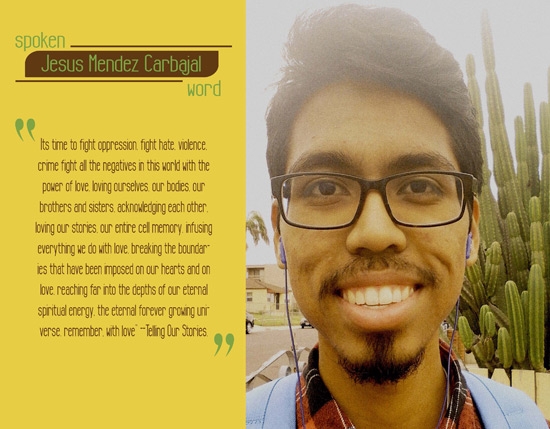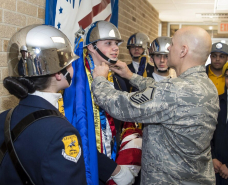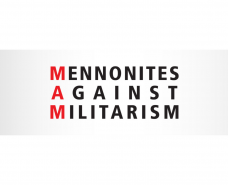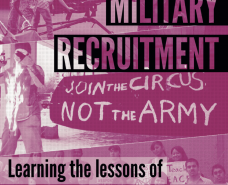Reflection on My Time as Project YANO’s Student Intern

Jesus Mendez-Carbajal - In the past nine months as Project YANO’s 2013-2014 student intern, I have learned an immense amount of information about U.S. militarism, its far reach, and counter-recruitment. I have been directly impacted on multiple levels. I have grown mentally through the knowledge I have gained and also personally through the interactions and relationships I have built with youth, advisors, teachers, mentors, and Project YANO supporters, volunteers and board members. I have had the pleasure of working with students who look like me, engaging low-income youth of color who have stories and backgrounds similar to my own.
At the time I began the internship, I had accepted and started working as an intern for another local non-profit organization. I am very grateful to both organizations for the opportunities they have provided me and for the personal and professional growth they have facilitated both for me and in me. I am especially grateful for the fact that both were paid internships, which allowed me the freedom to do work that I enjoy, that I am passionate about, and that is not routine -- because, as I experienced first-hand while I worked at Wendy’s, repetitive work is tiresome work.
When I began, I was very excited to intern with YANO but I was also a bit nervous and scared about successfully balancing school, my second internship, and personal life. From YANO, its board members, program coordinator and volunteers, I learned lessons in non-profit organizing, basic mailing operations, and fund appeal letter writing; strengthened my facilitation, time management, and multitasking skills; and acquired an expanded interdisciplinary view of the world.
Prior to applying for the position, I learned about Project YANO and heard about meetings, workshops, and conferences through board members who also happen to be some of my very close friends. They would say things like: “Oh! Project YANO is doing this and doing that,” and “We decided to move forward with this,” and I would think to myself, “Wow, that sounds awesome! I wonder how and if I can join?” I never actually asked, so when the internship opportunity presented itself I gladly applied.
Because the organization has been around since the 1980s and has adopted a broad analysis for counter-recruitment work, as this year’s intern I had the opportunity to make important connections. I identify as a low-income, undocumented, queer Chicano. Through Project YANO I was able to learn about militarism and counter-recruitment and bring these issues together with my own experience and that of other low-income, undocumented, and queer students of color.
Growing up, I was privileged to attend the Preuss School, a local 6-12 grade public charter school specifically designed to track low-income students into higher education -- those who largely also happen to be students of color. Preuss is located/isolated on the University of California San Diego’s campus in La Jolla, next door to La Jolla Country Day, a well-funded private school with a majority of affluent white student enrollment. Although I grew up watching ads on television and received pamphlets in the mail about enlisting in the armed forces, at school I never interacted with a recruiting officer, either off campus and or while at Preuss. Because of this, I came into Project YANO not knowing the extent of recruitment and militarism in schools, policy, and laws.
However, as a transfer student majoring in Chicana/o Studies at San Diego State, I have learned the historical context in which the U.S. has lived as a country in constant war, internal or otherwise, since its establishment as a nation. I have been able to change my binary way of thinking from the military is bad/good towards a more complex analysis of the issue, taking into consideration factors such as education systems and politics that facilitate the high enlistment of low-income people of color.
I did consider enlisting in the military while in my high school sophomore/junior years for a couple of reasons. I wanted to continue into higher education, but I did not have the best of grades and had an undocumented immigration status. Thanks to a high school college advisor (which not all students have, but should), I was shown non-military alternatives to successfully continue in higher education and eventually received legal status.
All in all, my time as YANO’s student intern has, without a doubt, served me well. I am stepping out of the position with strengthened relationships with other passionate and committed people. I am leaving with more knowledge about counter-recruitment and the military’s reach into schools for its own needs (e.g., funding STEM programs in high schools). I now have a larger sense of the history of San Diego and local counter-recruitment efforts in the largest military complex in the world, as well as the other issues we are faced with today in San Diego County.
Although I am ending my time as the student intern, I am transitioning to a board member position, continuing the very important work Project YANO has done since its inception. Counter-recruitment opens the eyes and minds of low-income youth to alternative possibilities that are just as good, and sometimes even better, than enlisting in the military (depending on who you ask). I would like to thank Project YANO, the Committee Opposed to Militarism and the Draft, and all their members, volunteers and supporters for all their work in keeping the organizations alive and for fighting militarism and recruitment of high rates of low-income youth of color.
Source: http://comdsd.org
###
Countering Military Recruitment

WRI's new booklet, Countering Military Recruitment: Learning the lessons of counter-recruitment campaigns internationally, is out now. The booklet includes examples of campaigning against youth militarisation across different countries with the contribution of grassroot activists.
You can order a paperback version here.








